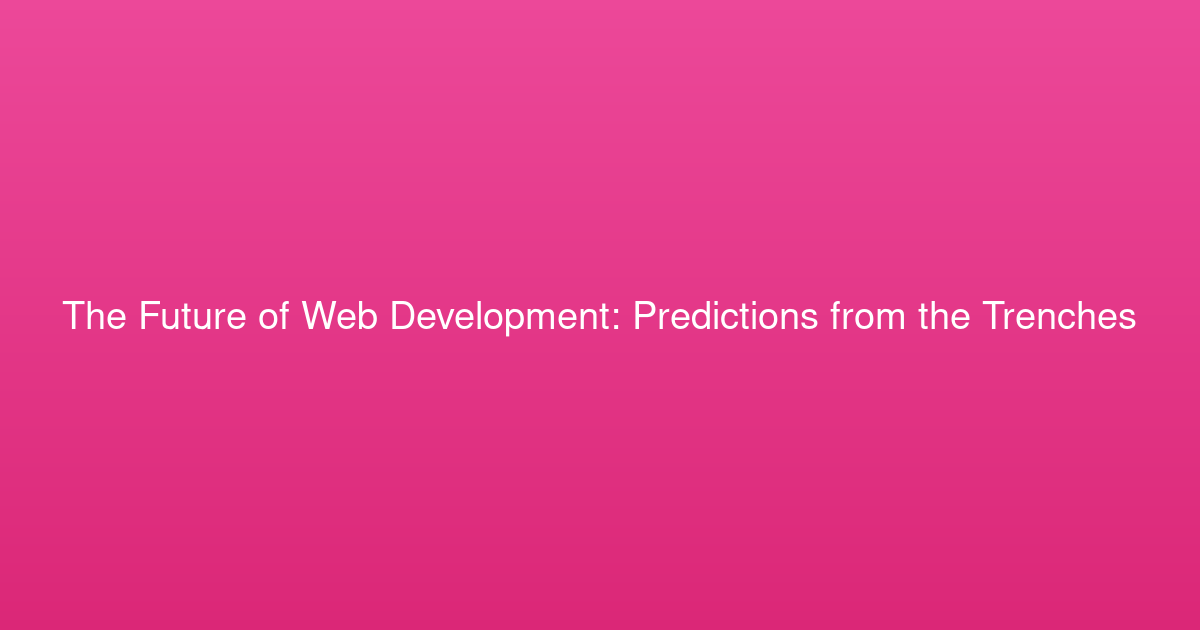The Future of Web Development: Predictions from the Trenches
Where web development is heading, from someone who’s been wrong before but keeps trying.

The Future of Web Development: Predictions from the Trenches
Published: November 5, 2025
I’ve been wrong about technology predictions before. In 2008, I thought mobile web apps would never replace native apps. In 2015, I predicted React was just a fad. In 2020, I was convinced AI would never be useful for actual coding work. So take these predictions with a healthy dose of skepticism—but also consider that sometimes being wrong teaches you what to look for when you’re right.
After 20+ years in web development, watching technologies rise and fall, and currently building sites in an era where AI can write functional code, I have thoughts about where we’re heading. These aren’t wild fantasies—they’re extrapolations from trends I see every day in client work and industry conversations.
AI Will Become the New Junior Developer
This isn’t about AI replacing developers—it’s about AI replacing the boring parts of development. In 2025, I already use Claude and ChatGPT for boilerplate code, debugging assistance, and code reviews. By 2030, AI will handle most routine coding tasks entirely.
**What this looks like in practice:**
- AI generates complete WordPress plugins from natural language descriptions
- Automatic code optimization and security fixes happen in real-time
- Bug reports include AI-generated fixes, not just error descriptions
- Code reviews become primarily about business logic, not syntax and best practices
The implication: senior developers will focus on architecture, user experience, and business problem-solving. Junior developers will need to differentiate themselves through domain expertise and creative problem-solving, not just coding ability.
WordPress Will Finally Modernize (Or Die)
WordPress powers 43% of the web, but it’s showing its age. The next five years will determine whether WordPress evolves into a modern application platform or gets gradually replaced by newer solutions.
**The modernization path:**
- Full adoption of modern PHP features and development practices
- Native headless/API-first architecture that doesn’t feel bolted-on
- Better developer experience with improved tooling and documentation
- Performance optimizations that make WordPress genuinely fast by default
**The decline path:**
- Continued reliance on legacy patterns while competitors innovate
- Plugin ecosystem fragmentation as developers choose modern alternatives
- Security and performance issues that enterprise customers can’t ignore
- Gradual market share loss to headless CMS and site builders
My prediction: WordPress will modernize, but slowly. It’ll retain market leadership through 2030 but lose significant ground to more modern alternatives.
The Return of Server-Side Rendering
The pendulum is swinging back from client-side JavaScript frameworks. Not because React and Vue are bad, but because the complexity-to-benefit ratio got out of hand for most websites.
**What’s driving this:**
- Google’s Core Web Vitals penalizing heavy JavaScript applications
- Developer fatigue with complex build processes and framework churn
- Recognition that most business websites don’t need SPA complexity
- Improved server-side frameworks that provide modern DX without client-side overhead
Technologies like Astro, Eleventy, and server-side rendering React (Next.js) are growing because they deliver modern developer experience with better performance. By 2030, “JavaScript-optional” will be a selling point, not a limitation.
No-Code Platforms Will Eat the Simple Stuff
No-code platforms won’t replace developers, but they’ll capture a significant portion of simple website and application projects. Webflow, Framer, and similar tools are already good enough for basic business sites.
**The no-code takeover:**
- Marketing sites and simple e-commerce will largely move to no-code platforms
- Internal business tools will be built by non-developers using no-code solutions
- Simple CRUD applications will become drag-and-drop affairs
- Custom development will focus on complex, unique problems
This is actually good news for developers. Let no-code handle the commodity work while we focus on interesting problems that require actual programming skills.
Performance Will Finally Matter (For Real This Time)
Google’s Core Web Vitals weren’t just a ranking factor—they were a warning shot. Site performance will become a competitive advantage as user expectations continue rising and search penalties get stricter.
**Performance as a feature:**
- Sub-second page loads will become table stakes for business websites
- Real-time performance monitoring will be standard, not optional
- Performance budgets will be enforced automatically in development pipelines
- Hosting providers will compete on speed metrics, not just uptime
The slow, bloated websites that dominate today’s web will become increasingly expensive to maintain as they lose traffic and conversions to faster competitors.
The API Economy Will Explode
Every service will have an API, and every website will integrate multiple APIs. The monolithic website approach will give way to composable architectures where best-of-breed services are stitched together.
**What this enables:**
- Specialized services for payments, search, analytics, content management, etc.
- Faster development through service composition instead of custom development
- Better user experiences through best-in-class functionality for each feature
- More resilient applications through distributed architecture
Developers will become integration specialists, orchestrating services rather than building everything from scratch.
Privacy and Security Will Drive Architecture Decisions
GDPR was just the beginning. Privacy regulations will continue tightening, and security breaches will become more expensive. This will fundamentally change how we build web applications.
**Privacy-first development:**
- Data minimization will be a core design principle, not an afterthought
- Edge computing will reduce data centralization and improve privacy
- Zero-trust security models will become standard for web applications
- Privacy-preserving analytics will replace traditional tracking
Developers who understand privacy and security deeply will become increasingly valuable as regulations tighten and customer awareness grows.
The Browser Will Become the Operating System
Web applications will continue displacing native apps for most use cases. Progressive Web Apps, WebAssembly, and improving browser APIs will make the distinction between web and native apps largely irrelevant.
**Browser-native everything:**
- Desktop-class applications running entirely in browsers
- File system access, hardware integration, and offline functionality becoming standard
- Cross-platform development simplified through web technologies
- App stores becoming less relevant as direct web distribution improves
This will simplify development and deployment while giving users more control over their computing environment.
Predictions I’m Less Confident About
**WebAssembly will revolutionize frontend development:** Maybe, but JavaScript is entrenched and WASM adoption has been slower than expected.
**Blockchain will find legitimate web use cases:** Possible, but after years of hype, practical applications remain limited.
**Virtual and augmented reality will drive new web standards:** The technology is improving, but mainstream adoption is still unclear.
**Edge computing will replace traditional hosting:** Edge is growing, but data gravity and latency requirements vary by application.
What This Means for Developers
**Focus on problems, not technologies.** The specific frameworks and tools will change, but the ability to solve business problems with technology will always be valuable.
**Embrace AI as a collaborator.** Don’t fight the tools that make you more productive. Learn to work with AI effectively rather than seeing it as competition.
**Develop T-shaped skills.** Deep expertise in one area plus broad knowledge across multiple technologies will be more valuable than narrow specialization.
**Prioritize user experience.** Technical elegance matters less than solving real problems for real people.
**Stay adaptable.** The technologies will change faster than your career. Curiosity and learning ability matter more than current tool knowledge.
The Bigger Picture
Web development is maturing from a craft to an engineering discipline. The cowboy coding days are ending, replaced by systematic approaches to performance, security, and maintainability.
This is good news. As the industry matures, the work becomes more interesting. Instead of fighting browser compatibility issues and rebuilding authentication systems, we can focus on creating genuinely useful applications that solve real problems.
The future of web development isn’t about any specific technology—it’s about building better experiences for users while making the development process more productive and enjoyable for creators.
That’s a future worth building toward, regardless of which specific predictions turn out to be right.
